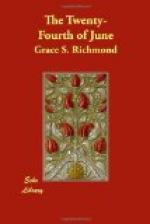“Then it wasn’t that. Perhaps my coat collar was turned up?”
“Why, no,” the boy laughed. “You look as right as anything. What made you think—”
“I saw you and your sister laughing at me and it worried me. I thought I must be looking the guy some way.”
Ted considered. “Oh, no!” he said. “She asked me if I thought you were enjoying the dinner as well as you would have liked the corn-popping.”
“And what did you decide?”
“I said I couldn’t tell, because I never saw you at a corn-popping. I asked her that day we went to walk why she wouldn’t ask you to it, but she just said you were too busy to come. I didn’t think you acted too busy to come,” he said naively, glancing up into Richard’s down-bent face.
“Didn’t I? Haven’t I looked very busy whenever you have seen me in your uncle’s library?”
Ted shook his head. “I don’t think you have—not the way Louis looks busy in father’s office, nor the way father does.”
Richard laughed, but somehow the frank comment stung him a little, as he would not have imagined the comment of an eleven-year-old boy could have done. “See here, Ted,” he urged, “tell me why you say that. I think myself I’ve done a lot of work since I’ve been here, and I can’t see why I haven’t looked it.”
But Ted shook his head. “I don’t think it would be polite to tell you,” he said, which naturally did not help matters much.
Still holding the lad’s arm, Richard walked over to Roberta, who had gone to the piano and was arranging some sheets of music there.
“Miss Gray,” he said, “have you accomplished a great deal to-day?”
She looked up, puzzled. “A great deal of what?” she asked.
“Work—endeavour—strenuous endeavour.”
“The usual amount. Lessons—and lessons—and one more lesson. I have really more pupils than I can do justice to, but I am promised an assistant if the work grows too heavy,” she answered. “Why, please?”
“I’ve been wondering if the motto of the Gray family might be ’Let us, then, be up and doing.’ Ted gives me that notion.”
Roberta glanced at Ted, whose face had grown quite grave. “Can you tell him what the motto is, Ted?”
“Of course I can,” responded Ted proudly. “It’s Hoc age.”
Richard hastily summoned his Latin, but the verb bothered him for a minute. “This do,” he presently evolved. “Well, I should say I came pretty near it.”
“What’s yours?” the boy now inquired.
“My family motto? I believe it is Crux mihi ancora; but that doesn’t just suit me, so I’ve adopted one of my own”—he looked straight at Roberta—“Dum vivimus, vivamus. Isn’t that a pleasanter one in this workaday world?”
Ted was struggling hard, but his two months’ experience with the rudiments of Latin would not serve him. “What do they mean?” he asked eagerly.




